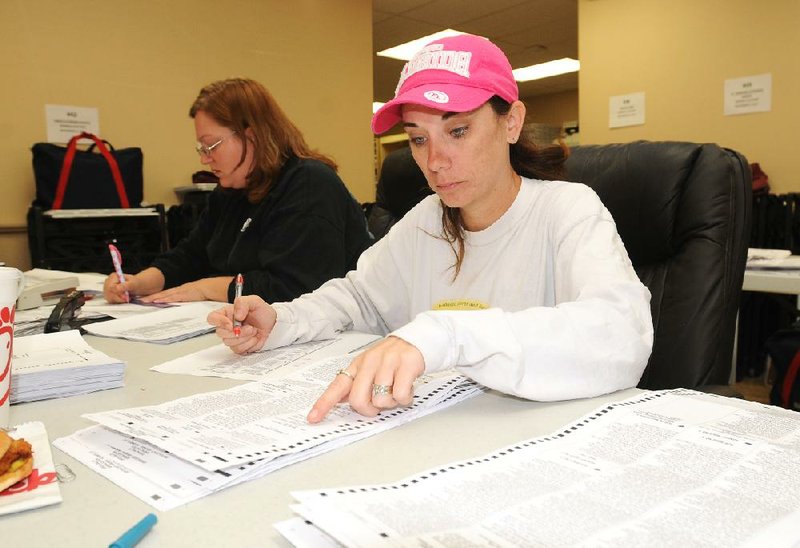LITTLE ROCK — Election results in Benton County remained up in the air Wednesday while officials waited for three ballot-counting machines to be repaired.
Benton County election officials expected most voters to cast ballots electronically Tuesday, but election workers offered paper ballots when lines ran long. Polling sites quickly depleted the limited supply of paper ballots, and problems arose when the county’s three ballot-counting machines broke down Tuesday night.
With ballots still to be counted, results for the District 95 state House race were incomplete Wednesday afternoon. Republican Sue Scott continued to lead with 6,234 votes over independent Mark Moore with 3,893 votes. Both candidates are from Pea Ridge.
Problems occur during every election, said Janine Parry, a political science professor at the University of Arkansas at Fayetteville, and “it just seems like Benton County drew the short straw this time.”
“I hope Benton County will be sharing its experiences with other counties so they could avoid that problem in the future,” Parry said.
Problems at polling sites can disenfranchise voters, Parry said. If they see long lines, some voters will give up and not vote, she said.
Tim Humphries, legal counsel for the state Board of Election Commissioners, said he had not received any formal complaints of election-law violations in Benton County, though he did receive several calls about the long lines and shortage of paper ballots.
In most elections, officials prepare enough paper ballots for about 10 percent of registered voters, said John Brown Jr., chairman of the Benton County Election Commission. With 113,000 registered voters in the county, election officials prepared 11,300 paper ballots for Election Day, he said.
“Most people who went to vote were standing in line,” Brown said. “They were offered paper ballots. It didn’t take any time to run out.”
Paper ballots began to run short about 9 a.m. Tuesday, prompting Brown to make a trip to Fort Smith at 10 a.m. for the special paper stock needed to print more ballots. He left Fort Smith after noon. The county printed several thousand ballots during the day, with small batches of ballots going out to polling sites as quickly as they were printed, he said.
“We print them on our ballot-on-demand printer,” Brown said. “It’s a very slow printer. They only suggest you try and print about 500 ballots [at a time].”
The printing was even more complicated because the Benton County Election Commission had to print 150 different ballot styles for 57 precincts, Brown said.
Despite testing the machines that tabulate results from paper ballots, the county’s three machines broke down one by one within about two hours, starting around 7:45 p.m., he said.
Election workers began hand-counting the ballots until about 3:30 a.m. Wednesday, when the secretary of state’s office gave them the OK to go home.
Brown and election workers started anew about 8 a.m. Wednesday. A technician was repairing the first of the machines Wednesday afternoon.
“It is rare for it to happen the way it did,” he said. “It happened. We’ve got to live with it, and we’ve got to recover from it.”
In addition to the shortage of paper ballots, county election officials learned Tuesday that one polling site had given as many as 400 voters the wrong ballots before the error was discovered.
Brown said the priority now is on counting the ballots. Once the results are complete, he anticipates meeting with the three election commissioners and the county election coordinator and develop a plan for a smoother election.
Polling sites that provide electronic voting machines typically will stock a limited number of paper ballots for voters who must cast provisional ballots, said Hal Bass, political science professor at Ouachita Baptist University in Arkadelphia.
Long lines would contribute to an unanticipated demand for those paper ballots, he said.
Other factors also could have contributed to Benton County’s woes Tuesday. Some voters encountered lengthy ballots, Bass said, and some take time to read the legal descriptions of constitutional amendments, which takes them more time to cast their ballots and contributes to longer waits.
The first election after redistricting also adds to the confusion, Bass said.
Voters’ polling sites may change, he said, and their state House districts and congressional districts also may change.
Bass anticipated that Scott would be elected to District 95, given her lead over Moore. He said that Republicans appeared to have 50 percent of the seats in the House.
Benton County Clerk Tena O’Brien said the county needs to look at its polling locations, as many are too small for the number of voters they are supposed to handle. O’Brien said she went to one location in Rogers and had to reconfigure the lines because voters could have walked up to the voting machines without going through the proper check-in process.
County Judge Bob Clinard said the combination of factors Tuesday created “a perfect storm” on Election Day, but he’s not sure what the solution might be.
County officials could be faulted for not providing enough resources at polling sites, but county governments nationwide have squeezed and pinched election budgets, said Andrew Dowdle, associate professor of political science at the University of Arkansas at Fayetteville.
“While you often have little stumbles, it did seem like they had significant problems over the course of the evening,” Dowdle said. “It’s highly possible with stretched resources they just ended up getting unlucky.”
Information for this article was contributed by Tom Sissom of NWA Media.
Front Section, Pages 1 on 11/08/2012
